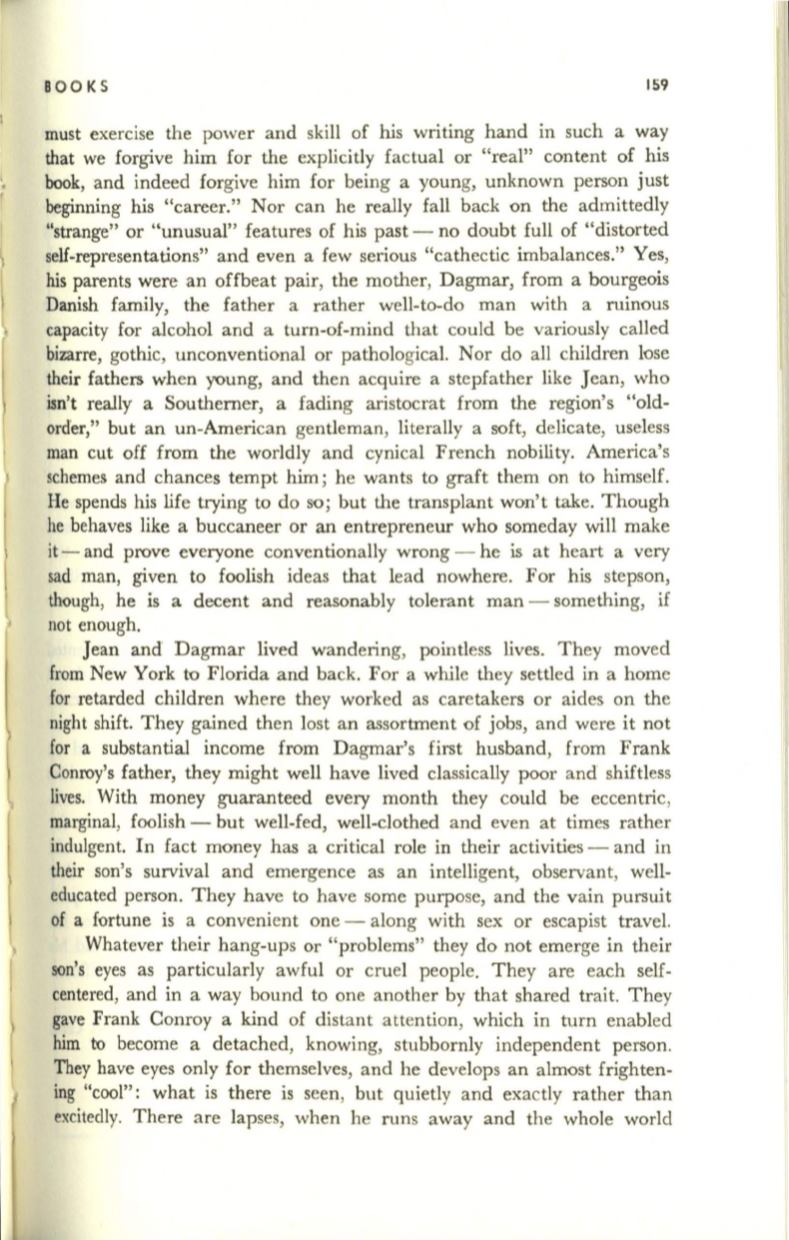
BOOKS
159
must exercise the power and skill of his wntmg hand in such a way
that we forgive him for the explicitly factual or "real" content of his
book, and indeed forgive him for being a young, unknown person just
beginning his "career." Nor can he really fall back on the admittedly
"strange" or "unusual" features of his past - no doubt full of "distorted
self-representations" and even a few serious "cathectic imbalances." Yes,
his parents were an offbeat pair, the mother, Dagmar, from a bourgeois
Danish family, the father a rather well-to-do man with a ruinous
capacity for alcohol and a turn-of-mind that could be variously called
bizarre, gothic, unconventional or pathological. Nor do all children lose
their fathers when young, and then acquire a stepfather like Jean, who
isn't really a Southerner, a fading aristocrat from the region's "old–
order," but an un-American gentleman, literally a soft, delicate, useless
man cut off from the worldly and cynical French nobility. America's
schemes and chances tempt him; he wants to graft them on to himself.
He spends his life trying to do so; but the transplant won't take. Though
he behaves like a buccaneer or an entrepreneur who someday will make
it- and prove everyone conventionally wrong - he is at heart a very
sad man, given to foolish ideas that lead nowhere. For his stepson,
though, he is a decent and reasonably tolerant man - something, if
not enough.
Jean and Dagmar lived wandering, pointless lives. They moved
from New York
to
Florida and back. For a while they settled in a home
for retarded children where they worked as caretakers or aides on the
night shift. They gained then lost an assortment of jobs, and were it not
for a substantial income from Dagmar's first husband, from Frank
Conroy's father, they might well have lived classically poor and shiftless
lives. With money guaranteed every month they could be eccentric,
marginal, foolish - but well-fed, well-clothed and even at times rather
indulgent. In fact money has a critical role in their activities - and in
their son's survival and emergence as an intelligent, observant, well–
educated person. They have to have some purpose, and the vain pursuit
of a fortune is a convenient one - along with sex or escapist travel.
Whatever their hang-ups or "problems" they do not emerge in their
son's eyes as particularly awful or cruel people. They are each self–
centered, and in a way bound to one another by that shared trait. They
gave Frank Conroy a kind of distant attention, which in tum enabled
him
to
become a detached, knowing, stubbornly independent person.
They have eyes only for themselves, and he develops an almost frighten–
ing "cool": what is there is seen, but quietly and exactly rather than
excitedly. There are lapses, when he runs away and the whole world


